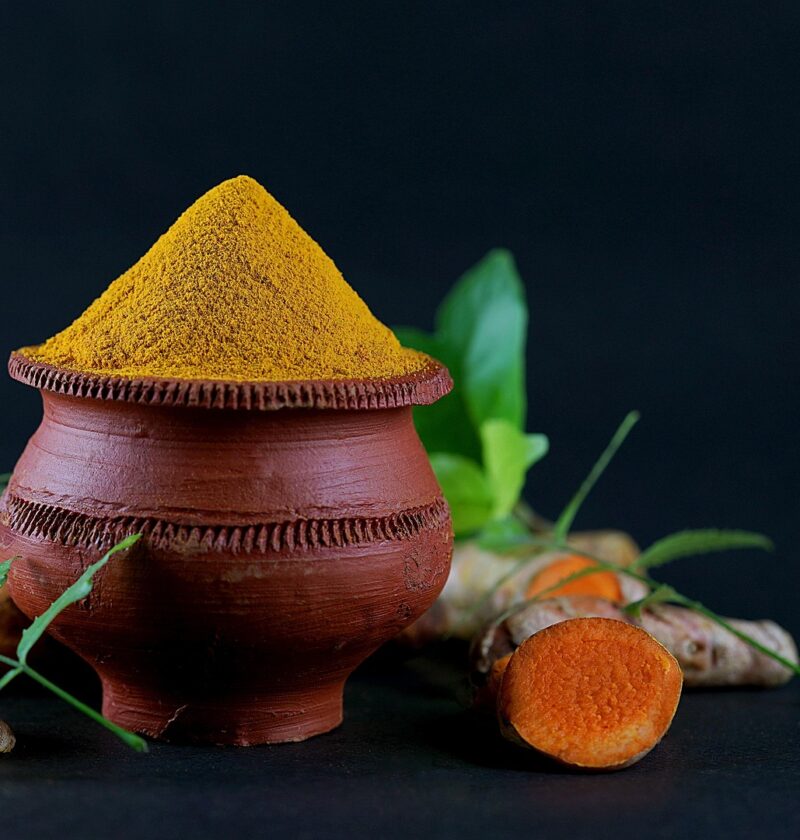Turmeric Spices Every Kitchen Needs
Turmeric is one of those spices that has been a staple in kitchens for centuries, yet science continues to uncover new reasons to appreciate it. It is known for its bright golden color and warm, earthy flavor. So, in this article, we will discuss the Top 10 Health Benefits of Turmeric Backed by Science. Turmeric has been part of Indian, Chinese, and Middle Eastern cooking for thousands of years.
It is not only valued as a spice but also as a medicine. The star compound in turmeric, curcumin, is what gives turmeric its yellow color and most of its health benefits.
Turmeric helps with digestion to protect the brain. Turmeric has been studied extensively, and the results are fascinating. If you have ever wondered why so many people add turmeric to smoothies, teas, or supplements, here is a simple, friendly breakdown of what turmeric can do for your body, backed by modern science.
Below are the Top 10 Health Benefits of Turmeric Backed by Science.
1 Turmeric May Reduce Inflammation
Inflammation is your body’s defense system. When you get a cut or an infection, your body uses inflammation to fight back. The problem starts when inflammation goes on for too long, leading to chronic conditions like arthritis, heart disease, or even cancer.
Curcumin in turmeric is a natural anti-inflammatory compound. In fact, some studies show that it can be as effective as certain anti-inflammatory drugs, without the side effects. Adding turmeric to your daily meals or taking it in supplement form may help reduce inflammation and protect the body against diseases linked to long-term inflammation.
2. It Supports Joint Health and Fights Arthritis
Arthritis is no joke. If you’ve ever felt that deep, nagging pain in your joints, especially in your knees, hips, or hands, you know just how frustrating it can be. It often shows up as swelling, stiffness, and limited movement, making everyday tasks like walking, cooking, or even getting out of bed feel like a challenge.
That’s why many people are always looking for natural ways to get relief. One popular option that’s been getting a lot of attention is turmeric, yes, that golden-yellow spice you might already have in your kitchen cabinet.
Turmeric is a bright yellow spice that comes from the root of a plant in the ginger family. It’s been used for thousands of years in India and other parts of Asia, not just for cooking but also in traditional medicine. It’s what gives curry its signature color, and it’s known for its earthy, slightly bitter taste.
But what makes turmeric really interesting, especially when we’re talking about arthritis, is a natural compound inside it called curcumin.
Curcumin is the Secret Weapon Inside Turmeric
Curcumin is the active ingredient in turmeric that’s believed to have powerful anti-inflammatory and antioxidant properties. That basically means it can help calm down inflammation in the body and fight off damage from harmful molecules (called free radicals) that build up over time.
Since arthritis is essentially inflammation in the joints, curcumin can be really helpful in managing the pain and stiffness that come with it. Research shows that curcumin can ease joint pain and improve flexibility. In one study, people with arthritis who took curcumin supplements reported less pain than those who took a common arthritis drug.
Turmeric is not a miracle cure, but it can support joint health and make everyday movement easier. A warm cup of turmeric tea or a supplement may help keep joints healthy as we age.
What Does the Science Say?
You might be wondering, “Does turmeric really work for arthritis, or is it just another health fad?” Good question.
Several studies have looked into this, and the results are actually pretty promising.
One well-known study found that people with rheumatoid arthritis or osteoarthritis who took curcumin supplements reported less joint pain and better mobility than people who took a commonly prescribed arthritis drug. In fact, in some cases, the results were just as good. Or even better than the medication, but with fewer side effects.
Of course, turmeric isn’t a magic bullet. It won’t “cure” arthritis, and it’s not going to replace your prescribed treatment plan. But when used alongside other healthy habits, it can be a great tool for managing symptoms and improving your quality of life.
How Can You Take Turmeric?
There are a few different ways people add turmeric to their daily routine:
Firstly Turmeric Supplements
These usually come in capsule or pill form and are made with concentrated amounts of curcumin. Many also contain black pepper extract (called piperine), which helps your body absorb curcumin better; otherwise, your body might not take in much of it.
If you’re thinking of trying a supplement, it’s a good idea to talk to your doctor first, especially if you’re on medications like blood thinners or have certain health conditions.
Secondly, Turmeric Tea
A warm cup of turmeric tea can be both soothing and healing. You can make it by simmering a teaspoon of turmeric powder in water or milk (dairy or plant-based), with a pinch of black pepper and a bit of honey or cinnamon for taste. This is especially nice before bed or on chilly mornings.
Thirdly, Cooking with Turmeric
Add it to soups, stews, rice, eggs, or roasted vegetables. It doesn’t add only color; it also brings in subtle flavor and health benefits. Turmeric is not going to give you instant relief like a painkiller might, but with regular use over time, many people notice improvements.
Some report:
- Less joint stiffness in the morning
- Reduced swelling
- Easier movement throughout the day
- Better overall comfort in the joints
But you know the saying that everyone’s body is different. Some people respond well, others may notice only small changes. But because turmeric is generally safe and natural, it’s worth exploring, especially if you’re looking for gentler ways to support your health.
Is Turmeric Worth a Try?
Yes, if you’re dealing with arthritis, even if it’s just starting or something you’ve been managing for years, turmeric could be a helpful addition to your daily routine. It’s not a replacement for your medications or your doctor’s advice, but it’s a natural, gentle support that many people swear by.
If you choose to sip it in tea, cook with it, or take it in supplement form, turmeric may help you move more easily, feel less pain, and enjoy life a little more, especially as you age.
Remember: Consistency is key. Give it a few weeks, and track how you feel.
And as always, talk to your healthcare provider before starting any new supplement, especially if you’re already taking medications.
3. Turmeric is Good for the Heart
Heart disease remains the leading cause of death worldwide, and one of the main reasons is inflammation and poor blood vessel health.
Curcumin has been found to improve the function of the lining of blood vessels, known as the endothelium. This helps regulate blood pressure, clotting, and circulation.
Some studies show that turmeric can reduce cholesterol levels and lower the risk of blocked arteries. By improving circulation and reducing inflammation, turmeric plays a supportive role in heart health.
4 It Boosts Brain Health and Memory
Have you ever walked into a room and forgotten why you are there? While everyone experiences memory lapses now and then, long-term brain decline can be more serious.
Curcumin can cross the blood-brain barrier, which means it can directly enter the brain. This is a big deal because not many compounds can do that. Once in the brain, curcumin helps increase levels of BDNF (Brain-Derived Neurotrophic Factor), a protein linked to memory and learning.
Low BDNF levels are connected to brain disorders like Alzheimer’s and depression. By boosting BDNF, turmeric may help protect memory, slow down age-related decline, and keep the brain sharper for longer.
5. Turmeric May Protect Against Cancer
Cancer happens when cells grow uncontrollably. Research suggests curcumin may help slow this process by affecting how cancer cells grow, develop, and spread.
Some studies in labs have shown that curcumin can reduce the growth of cancer cells and even kill some of them. While turmeric alone is not a cancer treatment, it may support conventional therapies and lower the risk of certain cancers when part of a healthy lifestyle.
This is an area of active research, but the results so far are very promising.
6. It Aids Digestion and Gut Health
If you suffer from bloating, gas, or indigestion, turmeric may be your friend. For centuries, people in India and China used turmeric as a digestive aid.
Modern science shows curcumin stimulates the gallbladder to produce bile, which helps digest fats. It also supports gut health by calming the lining of the digestive tract and reducing symptoms of irritable bowel syndrome (IBS).
Adding a little turmeric to curries, soups, or even warm milk can help keep your stomach happy and your digestion smooth.
7. Turmeric is a Natural Antioxidant
Every day, our bodies face damage from free radicals, unstable molecules that speed up aging and increase the risk of disease. Antioxidants are compounds that fight these free radicals, and turmeric is rich in them.
Curcumin is a powerful antioxidant that not only neutralizes free radicals but also boosts the body’s own antioxidant defenses. This double action makes turmeric one of the best natural ways to protect your cells from damage and keep your body youthful.
8. It Supports the Immune System
A strong immune system protects you from colds, flu, and infections. Turmeric contains antibacterial, antiviral, and antifungal properties that help the body fight off harmful invaders.
Curcumin also helps regulate immune activity, making sure the system is strong enough to fight infections but not so active that it attacks the body’s own cells.
A daily dose of turmeric, both in food, tea, or supplement form, can be a simple way to give your immune system extra support.
9. Turmeric May Improve Mood and Help with Depression
Mental health is as important as physical health, and turmeric may have a role to play here, too.
Low levels of BDNF (the brain growth hormone mentioned earlier) are linked to depression. Since curcumin increases BDNF, it may help improve mood and brain function.
In some studies, turmeric supplements worked as well as antidepressant drugs for people with mild depression, without the side effects. More research is still needed, but the link between turmeric and better mental well-being is strong enough to be encouraging.
10. Turmeric Supports Healthy Skin
From acne to aging, turmeric has long been used in natural skincare routines. In India, brides traditionally use turmeric pastes to brighten their skin before weddings.
Science backs this up: turmeric’s anti-inflammatory and antioxidant properties help reduce redness, fight bacteria, and slow down wrinkles. Applied directly or consumed regularly, turmeric supports clearer, healthier-looking skin.
How to Use Turmeric Effectively
The benefits of turmeric are clear, but here is one challenge: turmeric on its own is not absorbed well by the body. The good news is that you can improve absorption with a simple trick: combine turmeric with black pepper.
Black pepper contains piperine, a compound that boosts turmeric absorption by up to 2,000%. Cooking turmeric in a little healthy fat (like olive oil or coconut oil) also helps the body absorb it better.
How Much Turmeric Should You Take?
In food: Even small daily amounts in cooking provide benefits.
In supplements: Studies often use 500 – 2,000 mg of curcumin per day, usually in capsules that also contain piperine.
It is always best to consult a doctor before starting any supplement, especially if you take medication or have health conditions.
Conclusion
Turmeric is more than a colorful spice for curries and teas. Backed by science, it supports almost every part of the body, from the heart to the brain, from the joints to the skin.
By reducing inflammation, protecting cells, boosting mood, and strengthening immunity, turmeric proves why ancient traditions valued it so highly.
Adding a pinch of turmeric to your meals or taking it in supplement form can be one of the simplest yet most powerful ways to support long-term health.
Next time you see that golden spice in your kitchen, remember, it is not only a flavor for your food, but also a natural fuel for your well-being.







